cultural autobiography
VerifiedAdded on 2023/01/06
|13
|4621
|88
AI Summary
Hi, for this assignment I need a report of 2000 words. This is about intercultural competence in business, the ass is about comparison of 2 cultures( mine as Romanian and the other as Slovakian). Using the culture questionnaire I have done my autobiography and one of my colleagues. These 2 autobiographies need to be found in the report as appendixes please. What need to be done is to compare these 2 autobiographies and find similarities and differences using the cultural frameworks, like Edward Hall, onion layer,iceberg or Kluckoln and Stridtbeck’s. Thank you.
Contribute Materials
Your contribution can guide someone’s learning journey. Share your
documents today.
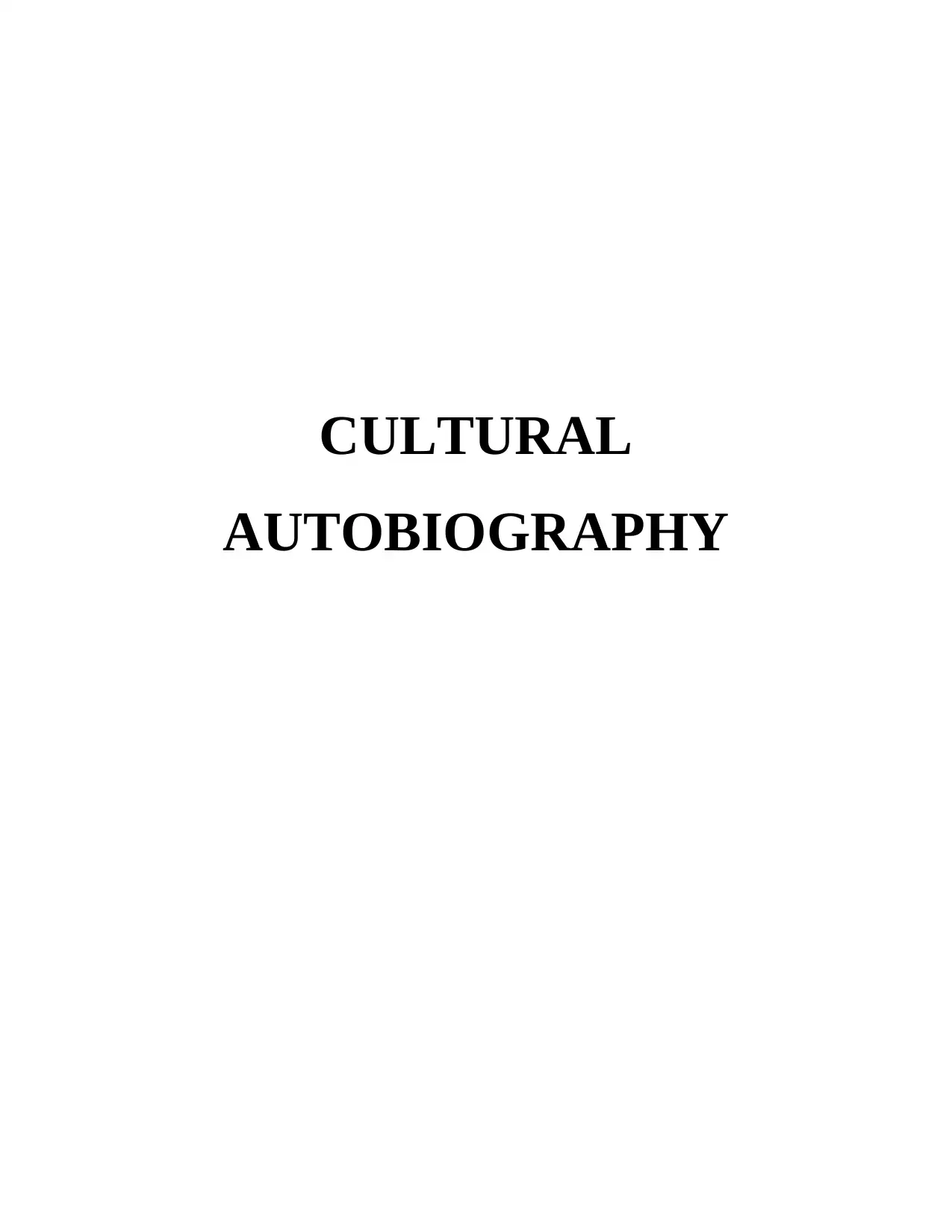
CULTURAL
AUTOBIOGRAPHY
AUTOBIOGRAPHY
Secure Best Marks with AI Grader
Need help grading? Try our AI Grader for instant feedback on your assignments.
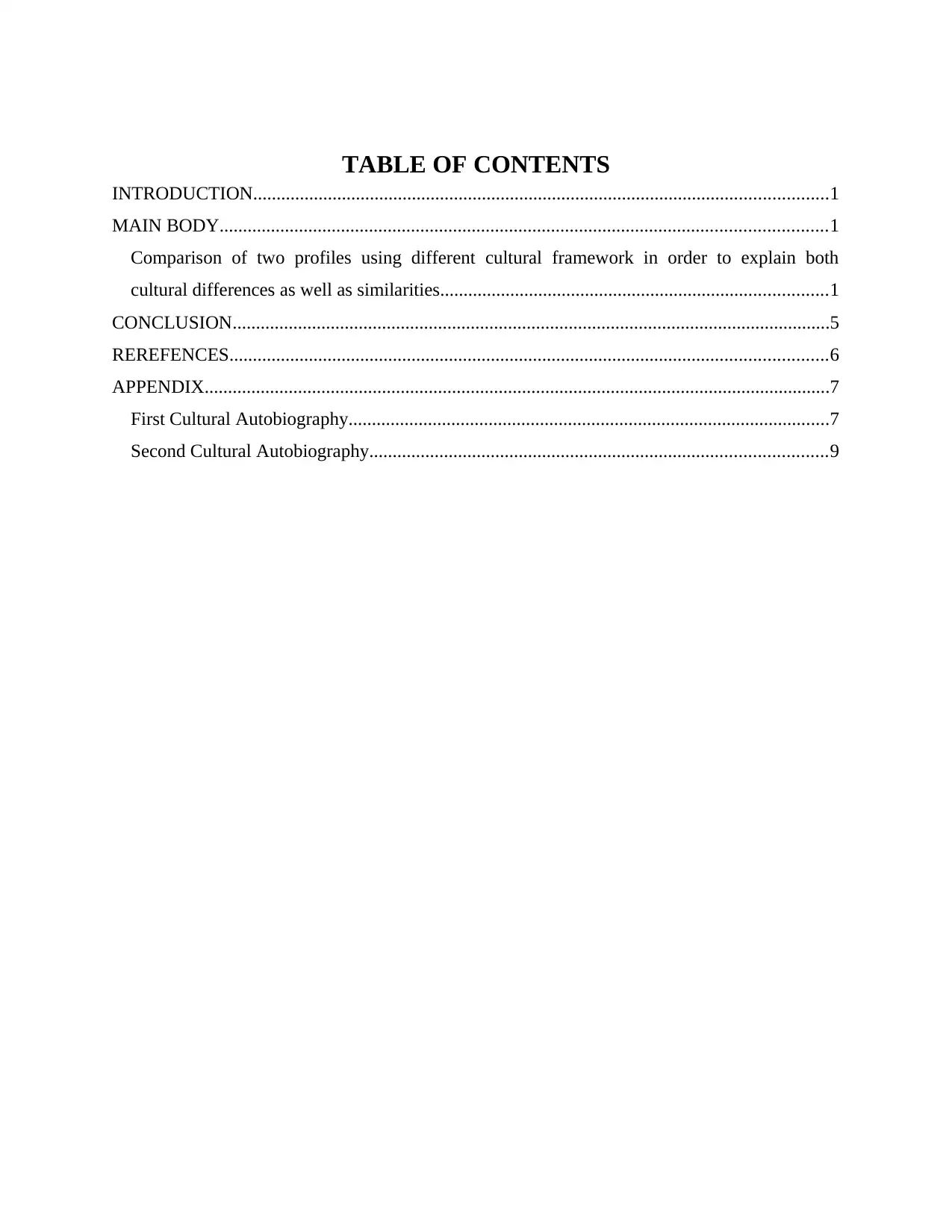
TABLE OF CONTENTS
INTRODUCTION...........................................................................................................................1
MAIN BODY..................................................................................................................................1
Comparison of two profiles using different cultural framework in order to explain both
cultural differences as well as similarities...................................................................................1
CONCLUSION................................................................................................................................5
REREFENCES................................................................................................................................6
APPENDIX......................................................................................................................................7
First Cultural Autobiography.......................................................................................................7
Second Cultural Autobiography..................................................................................................9
INTRODUCTION...........................................................................................................................1
MAIN BODY..................................................................................................................................1
Comparison of two profiles using different cultural framework in order to explain both
cultural differences as well as similarities...................................................................................1
CONCLUSION................................................................................................................................5
REREFENCES................................................................................................................................6
APPENDIX......................................................................................................................................7
First Cultural Autobiography.......................................................................................................7
Second Cultural Autobiography..................................................................................................9
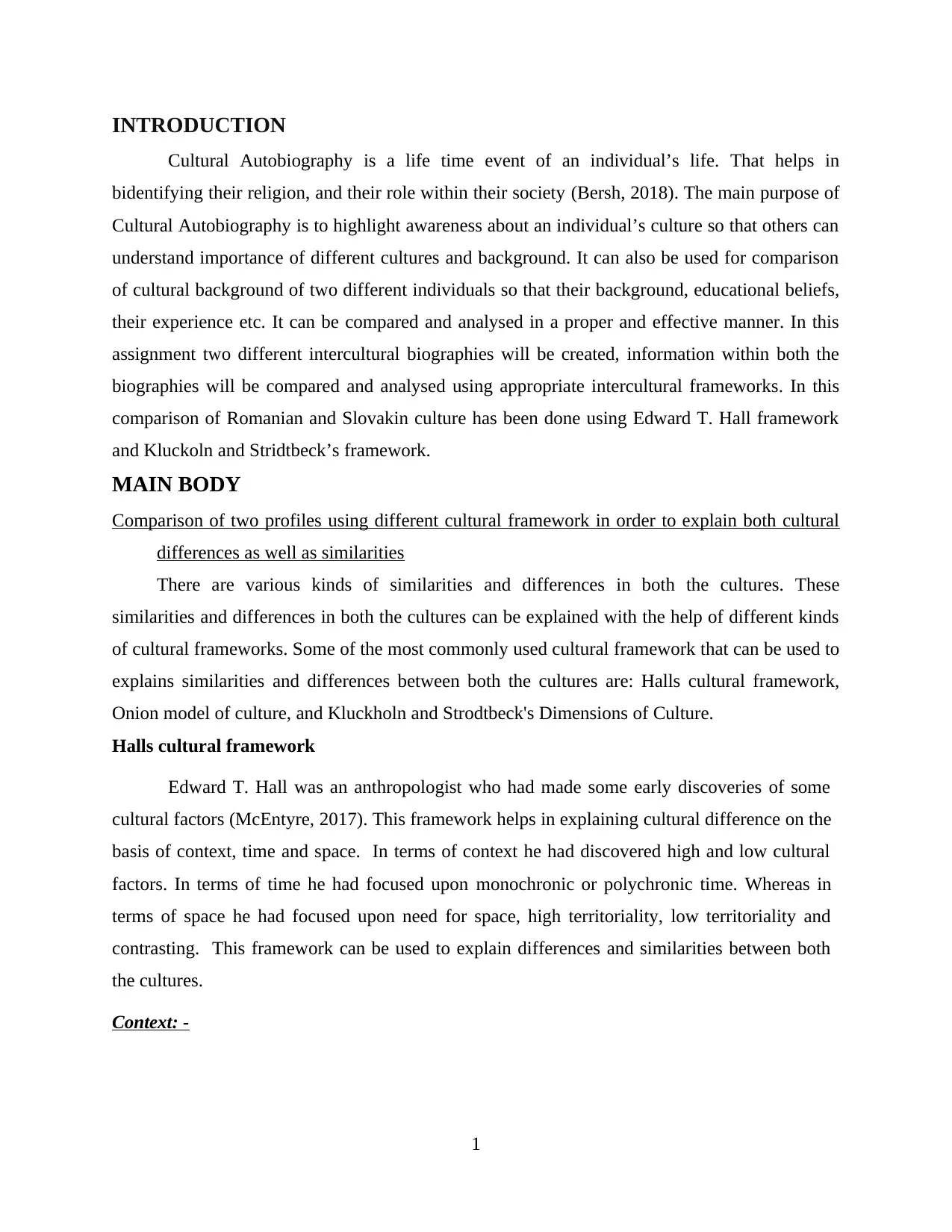
INTRODUCTION
Cultural Autobiography is a life time event of an individual’s life. That helps in
bidentifying their religion, and their role within their society (Bersh, 2018). The main purpose of
Cultural Autobiography is to highlight awareness about an individual’s culture so that others can
understand importance of different cultures and background. It can also be used for comparison
of cultural background of two different individuals so that their background, educational beliefs,
their experience etc. It can be compared and analysed in a proper and effective manner. In this
assignment two different intercultural biographies will be created, information within both the
biographies will be compared and analysed using appropriate intercultural frameworks. In this
comparison of Romanian and Slovakin culture has been done using Edward T. Hall framework
and Kluckoln and Stridtbeck’s framework.
MAIN BODY
Comparison of two profiles using different cultural framework in order to explain both cultural
differences as well as similarities
There are various kinds of similarities and differences in both the cultures. These
similarities and differences in both the cultures can be explained with the help of different kinds
of cultural frameworks. Some of the most commonly used cultural framework that can be used to
explains similarities and differences between both the cultures are: Halls cultural framework,
Onion model of culture, and Kluckholn and Strodtbeck's Dimensions of Culture.
Halls cultural framework
Edward T. Hall was an anthropologist who had made some early discoveries of some
cultural factors (McEntyre, 2017). This framework helps in explaining cultural difference on the
basis of context, time and space. In terms of context he had discovered high and low cultural
factors. In terms of time he had focused upon monochronic or polychronic time. Whereas in
terms of space he had focused upon need for space, high territoriality, low territoriality and
contrasting. This framework can be used to explain differences and similarities between both
the cultures.
Context: -
1
Cultural Autobiography is a life time event of an individual’s life. That helps in
bidentifying their religion, and their role within their society (Bersh, 2018). The main purpose of
Cultural Autobiography is to highlight awareness about an individual’s culture so that others can
understand importance of different cultures and background. It can also be used for comparison
of cultural background of two different individuals so that their background, educational beliefs,
their experience etc. It can be compared and analysed in a proper and effective manner. In this
assignment two different intercultural biographies will be created, information within both the
biographies will be compared and analysed using appropriate intercultural frameworks. In this
comparison of Romanian and Slovakin culture has been done using Edward T. Hall framework
and Kluckoln and Stridtbeck’s framework.
MAIN BODY
Comparison of two profiles using different cultural framework in order to explain both cultural
differences as well as similarities
There are various kinds of similarities and differences in both the cultures. These
similarities and differences in both the cultures can be explained with the help of different kinds
of cultural frameworks. Some of the most commonly used cultural framework that can be used to
explains similarities and differences between both the cultures are: Halls cultural framework,
Onion model of culture, and Kluckholn and Strodtbeck's Dimensions of Culture.
Halls cultural framework
Edward T. Hall was an anthropologist who had made some early discoveries of some
cultural factors (McEntyre, 2017). This framework helps in explaining cultural difference on the
basis of context, time and space. In terms of context he had discovered high and low cultural
factors. In terms of time he had focused upon monochronic or polychronic time. Whereas in
terms of space he had focused upon need for space, high territoriality, low territoriality and
contrasting. This framework can be used to explain differences and similarities between both
the cultures.
Context: -
1
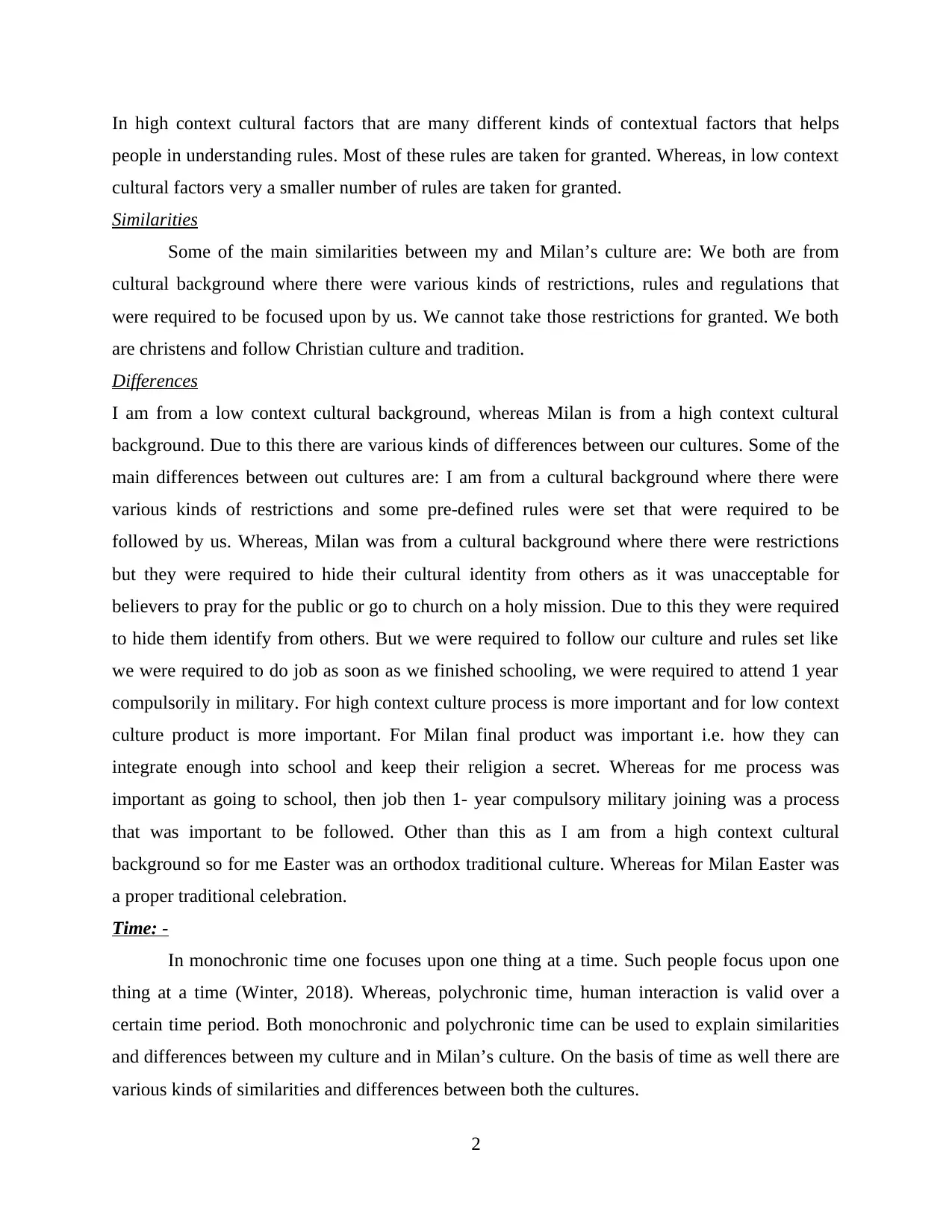
In high context cultural factors that are many different kinds of contextual factors that helps
people in understanding rules. Most of these rules are taken for granted. Whereas, in low context
cultural factors very a smaller number of rules are taken for granted.
Similarities
Some of the main similarities between my and Milan’s culture are: We both are from
cultural background where there were various kinds of restrictions, rules and regulations that
were required to be focused upon by us. We cannot take those restrictions for granted. We both
are christens and follow Christian culture and tradition.
Differences
I am from a low context cultural background, whereas Milan is from a high context cultural
background. Due to this there are various kinds of differences between our cultures. Some of the
main differences between out cultures are: I am from a cultural background where there were
various kinds of restrictions and some pre-defined rules were set that were required to be
followed by us. Whereas, Milan was from a cultural background where there were restrictions
but they were required to hide their cultural identity from others as it was unacceptable for
believers to pray for the public or go to church on a holy mission. Due to this they were required
to hide them identify from others. But we were required to follow our culture and rules set like
we were required to do job as soon as we finished schooling, we were required to attend 1 year
compulsorily in military. For high context culture process is more important and for low context
culture product is more important. For Milan final product was important i.e. how they can
integrate enough into school and keep their religion a secret. Whereas for me process was
important as going to school, then job then 1- year compulsory military joining was a process
that was important to be followed. Other than this as I am from a high context cultural
background so for me Easter was an orthodox traditional culture. Whereas for Milan Easter was
a proper traditional celebration.
Time: -
In monochronic time one focuses upon one thing at a time. Such people focus upon one
thing at a time (Winter, 2018). Whereas, polychronic time, human interaction is valid over a
certain time period. Both monochronic and polychronic time can be used to explain similarities
and differences between my culture and in Milan’s culture. On the basis of time as well there are
various kinds of similarities and differences between both the cultures.
2
people in understanding rules. Most of these rules are taken for granted. Whereas, in low context
cultural factors very a smaller number of rules are taken for granted.
Similarities
Some of the main similarities between my and Milan’s culture are: We both are from
cultural background where there were various kinds of restrictions, rules and regulations that
were required to be focused upon by us. We cannot take those restrictions for granted. We both
are christens and follow Christian culture and tradition.
Differences
I am from a low context cultural background, whereas Milan is from a high context cultural
background. Due to this there are various kinds of differences between our cultures. Some of the
main differences between out cultures are: I am from a cultural background where there were
various kinds of restrictions and some pre-defined rules were set that were required to be
followed by us. Whereas, Milan was from a cultural background where there were restrictions
but they were required to hide their cultural identity from others as it was unacceptable for
believers to pray for the public or go to church on a holy mission. Due to this they were required
to hide them identify from others. But we were required to follow our culture and rules set like
we were required to do job as soon as we finished schooling, we were required to attend 1 year
compulsorily in military. For high context culture process is more important and for low context
culture product is more important. For Milan final product was important i.e. how they can
integrate enough into school and keep their religion a secret. Whereas for me process was
important as going to school, then job then 1- year compulsory military joining was a process
that was important to be followed. Other than this as I am from a high context cultural
background so for me Easter was an orthodox traditional culture. Whereas for Milan Easter was
a proper traditional celebration.
Time: -
In monochronic time one focuses upon one thing at a time. Such people focus upon one
thing at a time (Winter, 2018). Whereas, polychronic time, human interaction is valid over a
certain time period. Both monochronic and polychronic time can be used to explain similarities
and differences between my culture and in Milan’s culture. On the basis of time as well there are
various kinds of similarities and differences between both the cultures.
2
Secure Best Marks with AI Grader
Need help grading? Try our AI Grader for instant feedback on your assignments.
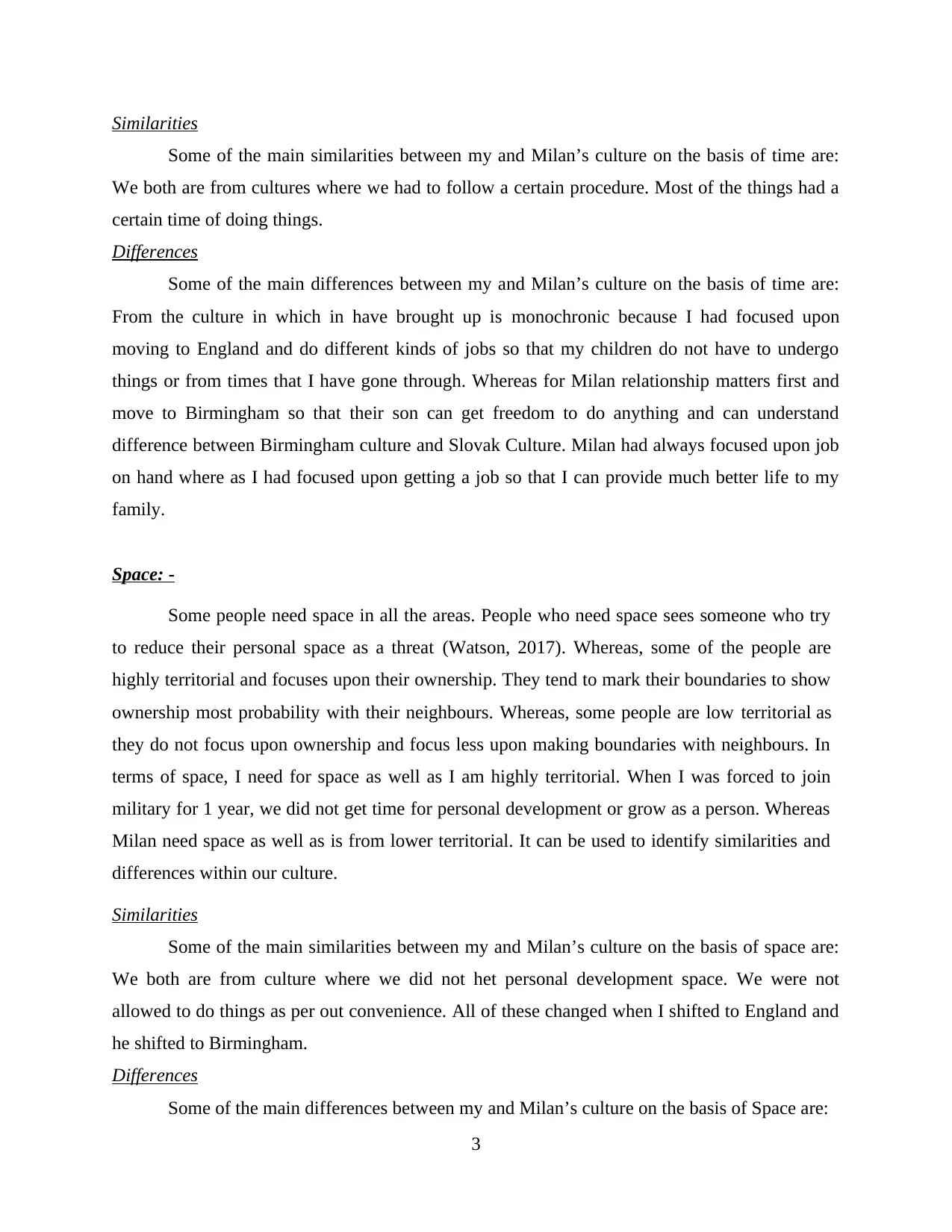
Similarities
Some of the main similarities between my and Milan’s culture on the basis of time are:
We both are from cultures where we had to follow a certain procedure. Most of the things had a
certain time of doing things.
Differences
Some of the main differences between my and Milan’s culture on the basis of time are:
From the culture in which in have brought up is monochronic because I had focused upon
moving to England and do different kinds of jobs so that my children do not have to undergo
things or from times that I have gone through. Whereas for Milan relationship matters first and
move to Birmingham so that their son can get freedom to do anything and can understand
difference between Birmingham culture and Slovak Culture. Milan had always focused upon job
on hand where as I had focused upon getting a job so that I can provide much better life to my
family.
Space: -
Some people need space in all the areas. People who need space sees someone who try
to reduce their personal space as a threat (Watson, 2017). Whereas, some of the people are
highly territorial and focuses upon their ownership. They tend to mark their boundaries to show
ownership most probability with their neighbours. Whereas, some people are low territorial as
they do not focus upon ownership and focus less upon making boundaries with neighbours. In
terms of space, I need for space as well as I am highly territorial. When I was forced to join
military for 1 year, we did not get time for personal development or grow as a person. Whereas
Milan need space as well as is from lower territorial. It can be used to identify similarities and
differences within our culture.
Similarities
Some of the main similarities between my and Milan’s culture on the basis of space are:
We both are from culture where we did not het personal development space. We were not
allowed to do things as per out convenience. All of these changed when I shifted to England and
he shifted to Birmingham.
Differences
Some of the main differences between my and Milan’s culture on the basis of Space are:
3
Some of the main similarities between my and Milan’s culture on the basis of time are:
We both are from cultures where we had to follow a certain procedure. Most of the things had a
certain time of doing things.
Differences
Some of the main differences between my and Milan’s culture on the basis of time are:
From the culture in which in have brought up is monochronic because I had focused upon
moving to England and do different kinds of jobs so that my children do not have to undergo
things or from times that I have gone through. Whereas for Milan relationship matters first and
move to Birmingham so that their son can get freedom to do anything and can understand
difference between Birmingham culture and Slovak Culture. Milan had always focused upon job
on hand where as I had focused upon getting a job so that I can provide much better life to my
family.
Space: -
Some people need space in all the areas. People who need space sees someone who try
to reduce their personal space as a threat (Watson, 2017). Whereas, some of the people are
highly territorial and focuses upon their ownership. They tend to mark their boundaries to show
ownership most probability with their neighbours. Whereas, some people are low territorial as
they do not focus upon ownership and focus less upon making boundaries with neighbours. In
terms of space, I need for space as well as I am highly territorial. When I was forced to join
military for 1 year, we did not get time for personal development or grow as a person. Whereas
Milan need space as well as is from lower territorial. It can be used to identify similarities and
differences within our culture.
Similarities
Some of the main similarities between my and Milan’s culture on the basis of space are:
We both are from culture where we did not het personal development space. We were not
allowed to do things as per out convenience. All of these changed when I shifted to England and
he shifted to Birmingham.
Differences
Some of the main differences between my and Milan’s culture on the basis of Space are:
3
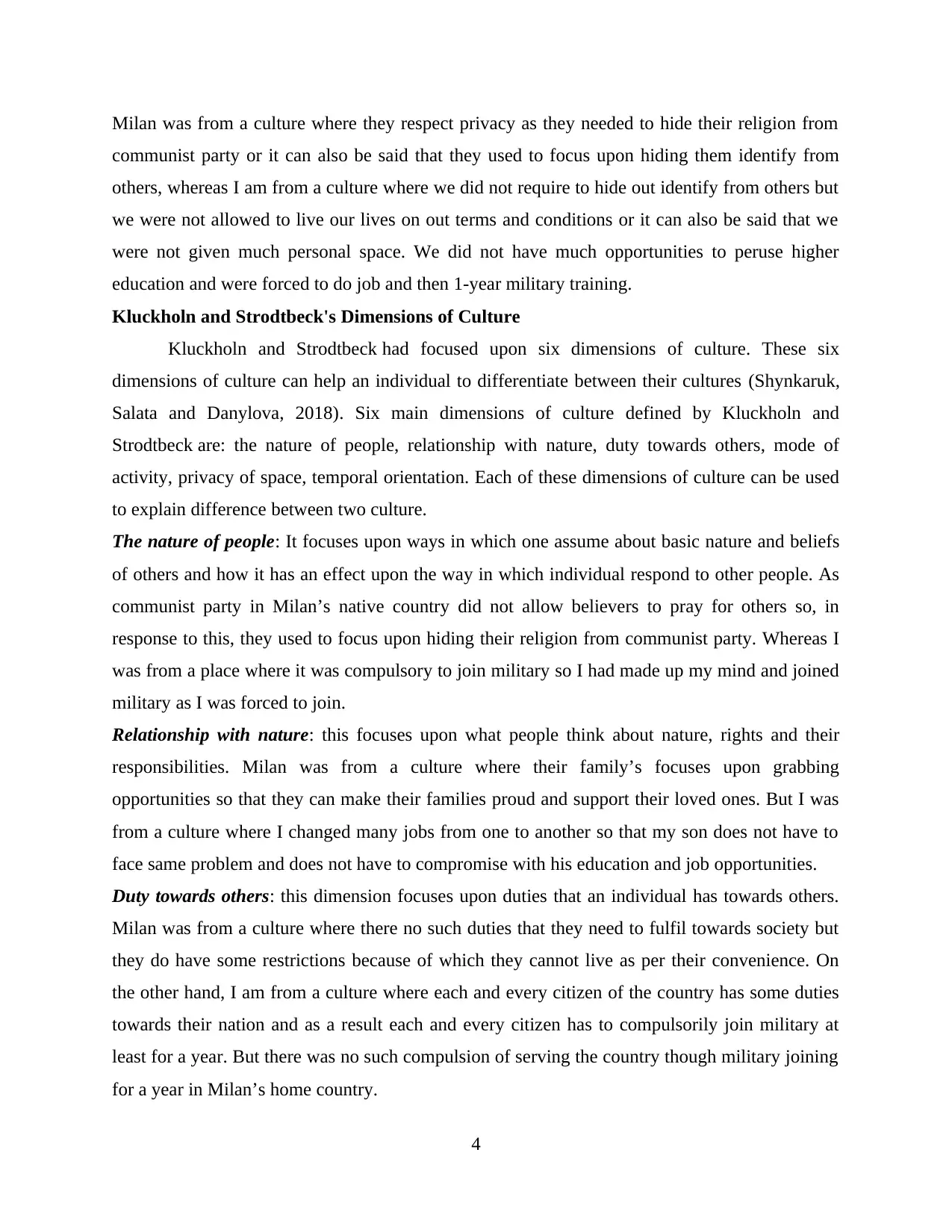
Milan was from a culture where they respect privacy as they needed to hide their religion from
communist party or it can also be said that they used to focus upon hiding them identify from
others, whereas I am from a culture where we did not require to hide out identify from others but
we were not allowed to live our lives on out terms and conditions or it can also be said that we
were not given much personal space. We did not have much opportunities to peruse higher
education and were forced to do job and then 1-year military training.
Kluckholn and Strodtbeck's Dimensions of Culture
Kluckholn and Strodtbeck had focused upon six dimensions of culture. These six
dimensions of culture can help an individual to differentiate between their cultures (Shynkaruk,
Salata and Danylova, 2018). Six main dimensions of culture defined by Kluckholn and
Strodtbeck are: the nature of people, relationship with nature, duty towards others, mode of
activity, privacy of space, temporal orientation. Each of these dimensions of culture can be used
to explain difference between two culture.
The nature of people: It focuses upon ways in which one assume about basic nature and beliefs
of others and how it has an effect upon the way in which individual respond to other people. As
communist party in Milan’s native country did not allow believers to pray for others so, in
response to this, they used to focus upon hiding their religion from communist party. Whereas I
was from a place where it was compulsory to join military so I had made up my mind and joined
military as I was forced to join.
Relationship with nature: this focuses upon what people think about nature, rights and their
responsibilities. Milan was from a culture where their family’s focuses upon grabbing
opportunities so that they can make their families proud and support their loved ones. But I was
from a culture where I changed many jobs from one to another so that my son does not have to
face same problem and does not have to compromise with his education and job opportunities.
Duty towards others: this dimension focuses upon duties that an individual has towards others.
Milan was from a culture where there no such duties that they need to fulfil towards society but
they do have some restrictions because of which they cannot live as per their convenience. On
the other hand, I am from a culture where each and every citizen of the country has some duties
towards their nation and as a result each and every citizen has to compulsorily join military at
least for a year. But there was no such compulsion of serving the country though military joining
for a year in Milan’s home country.
4
communist party or it can also be said that they used to focus upon hiding them identify from
others, whereas I am from a culture where we did not require to hide out identify from others but
we were not allowed to live our lives on out terms and conditions or it can also be said that we
were not given much personal space. We did not have much opportunities to peruse higher
education and were forced to do job and then 1-year military training.
Kluckholn and Strodtbeck's Dimensions of Culture
Kluckholn and Strodtbeck had focused upon six dimensions of culture. These six
dimensions of culture can help an individual to differentiate between their cultures (Shynkaruk,
Salata and Danylova, 2018). Six main dimensions of culture defined by Kluckholn and
Strodtbeck are: the nature of people, relationship with nature, duty towards others, mode of
activity, privacy of space, temporal orientation. Each of these dimensions of culture can be used
to explain difference between two culture.
The nature of people: It focuses upon ways in which one assume about basic nature and beliefs
of others and how it has an effect upon the way in which individual respond to other people. As
communist party in Milan’s native country did not allow believers to pray for others so, in
response to this, they used to focus upon hiding their religion from communist party. Whereas I
was from a place where it was compulsory to join military so I had made up my mind and joined
military as I was forced to join.
Relationship with nature: this focuses upon what people think about nature, rights and their
responsibilities. Milan was from a culture where their family’s focuses upon grabbing
opportunities so that they can make their families proud and support their loved ones. But I was
from a culture where I changed many jobs from one to another so that my son does not have to
face same problem and does not have to compromise with his education and job opportunities.
Duty towards others: this dimension focuses upon duties that an individual has towards others.
Milan was from a culture where there no such duties that they need to fulfil towards society but
they do have some restrictions because of which they cannot live as per their convenience. On
the other hand, I am from a culture where each and every citizen of the country has some duties
towards their nation and as a result each and every citizen has to compulsorily join military at
least for a year. But there was no such compulsion of serving the country though military joining
for a year in Milan’s home country.
4
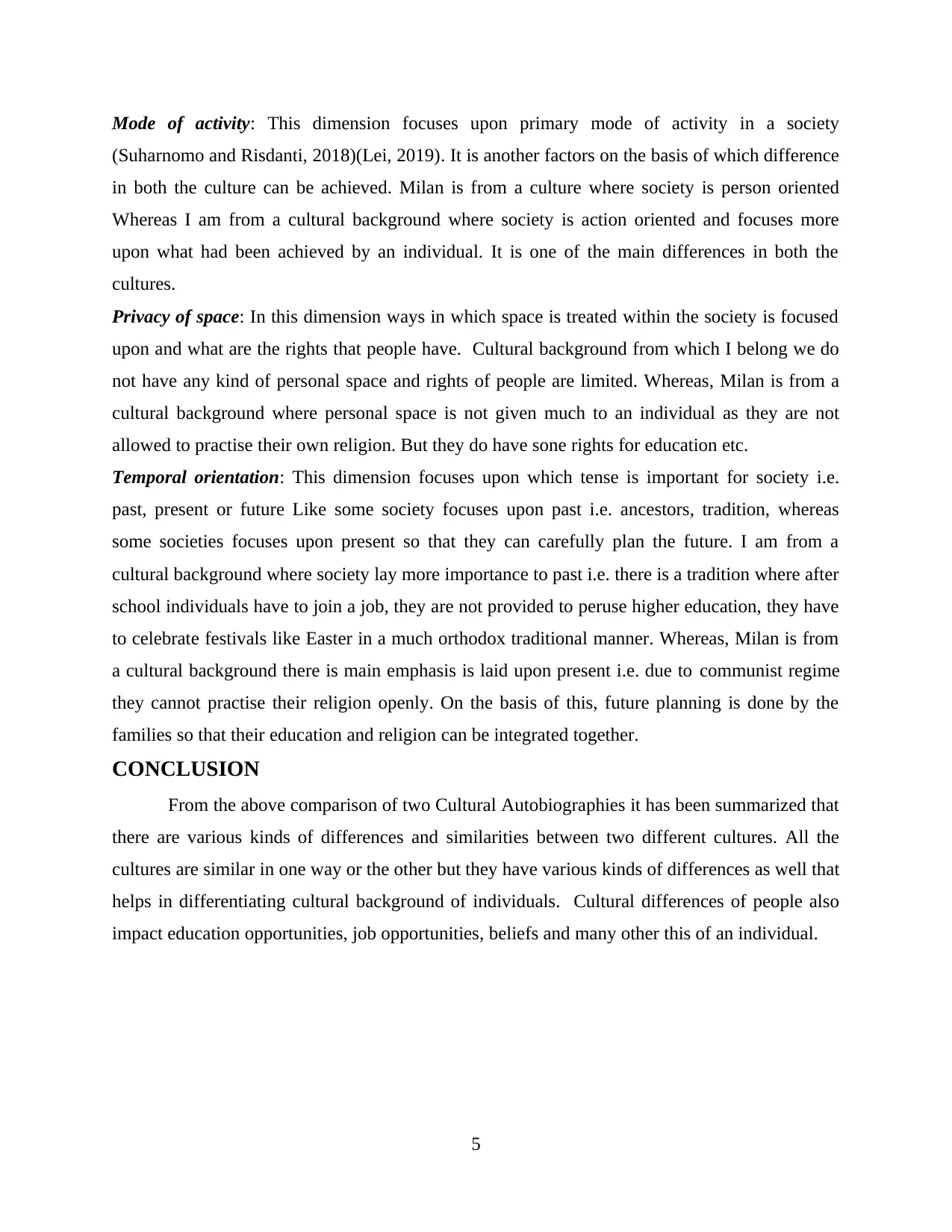
Mode of activity: This dimension focuses upon primary mode of activity in a society
(Suharnomo and Risdanti, 2018)(Lei, 2019). It is another factors on the basis of which difference
in both the culture can be achieved. Milan is from a culture where society is person oriented
Whereas I am from a cultural background where society is action oriented and focuses more
upon what had been achieved by an individual. It is one of the main differences in both the
cultures.
Privacy of space: In this dimension ways in which space is treated within the society is focused
upon and what are the rights that people have. Cultural background from which I belong we do
not have any kind of personal space and rights of people are limited. Whereas, Milan is from a
cultural background where personal space is not given much to an individual as they are not
allowed to practise their own religion. But they do have sone rights for education etc.
Temporal orientation: This dimension focuses upon which tense is important for society i.e.
past, present or future Like some society focuses upon past i.e. ancestors, tradition, whereas
some societies focuses upon present so that they can carefully plan the future. I am from a
cultural background where society lay more importance to past i.e. there is a tradition where after
school individuals have to join a job, they are not provided to peruse higher education, they have
to celebrate festivals like Easter in a much orthodox traditional manner. Whereas, Milan is from
a cultural background there is main emphasis is laid upon present i.e. due to communist regime
they cannot practise their religion openly. On the basis of this, future planning is done by the
families so that their education and religion can be integrated together.
CONCLUSION
From the above comparison of two Cultural Autobiographies it has been summarized that
there are various kinds of differences and similarities between two different cultures. All the
cultures are similar in one way or the other but they have various kinds of differences as well that
helps in differentiating cultural background of individuals. Cultural differences of people also
impact education opportunities, job opportunities, beliefs and many other this of an individual.
5
(Suharnomo and Risdanti, 2018)(Lei, 2019). It is another factors on the basis of which difference
in both the culture can be achieved. Milan is from a culture where society is person oriented
Whereas I am from a cultural background where society is action oriented and focuses more
upon what had been achieved by an individual. It is one of the main differences in both the
cultures.
Privacy of space: In this dimension ways in which space is treated within the society is focused
upon and what are the rights that people have. Cultural background from which I belong we do
not have any kind of personal space and rights of people are limited. Whereas, Milan is from a
cultural background where personal space is not given much to an individual as they are not
allowed to practise their own religion. But they do have sone rights for education etc.
Temporal orientation: This dimension focuses upon which tense is important for society i.e.
past, present or future Like some society focuses upon past i.e. ancestors, tradition, whereas
some societies focuses upon present so that they can carefully plan the future. I am from a
cultural background where society lay more importance to past i.e. there is a tradition where after
school individuals have to join a job, they are not provided to peruse higher education, they have
to celebrate festivals like Easter in a much orthodox traditional manner. Whereas, Milan is from
a cultural background there is main emphasis is laid upon present i.e. due to communist regime
they cannot practise their religion openly. On the basis of this, future planning is done by the
families so that their education and religion can be integrated together.
CONCLUSION
From the above comparison of two Cultural Autobiographies it has been summarized that
there are various kinds of differences and similarities between two different cultures. All the
cultures are similar in one way or the other but they have various kinds of differences as well that
helps in differentiating cultural background of individuals. Cultural differences of people also
impact education opportunities, job opportunities, beliefs and many other this of an individual.
5
Paraphrase This Document
Need a fresh take? Get an instant paraphrase of this document with our AI Paraphraser
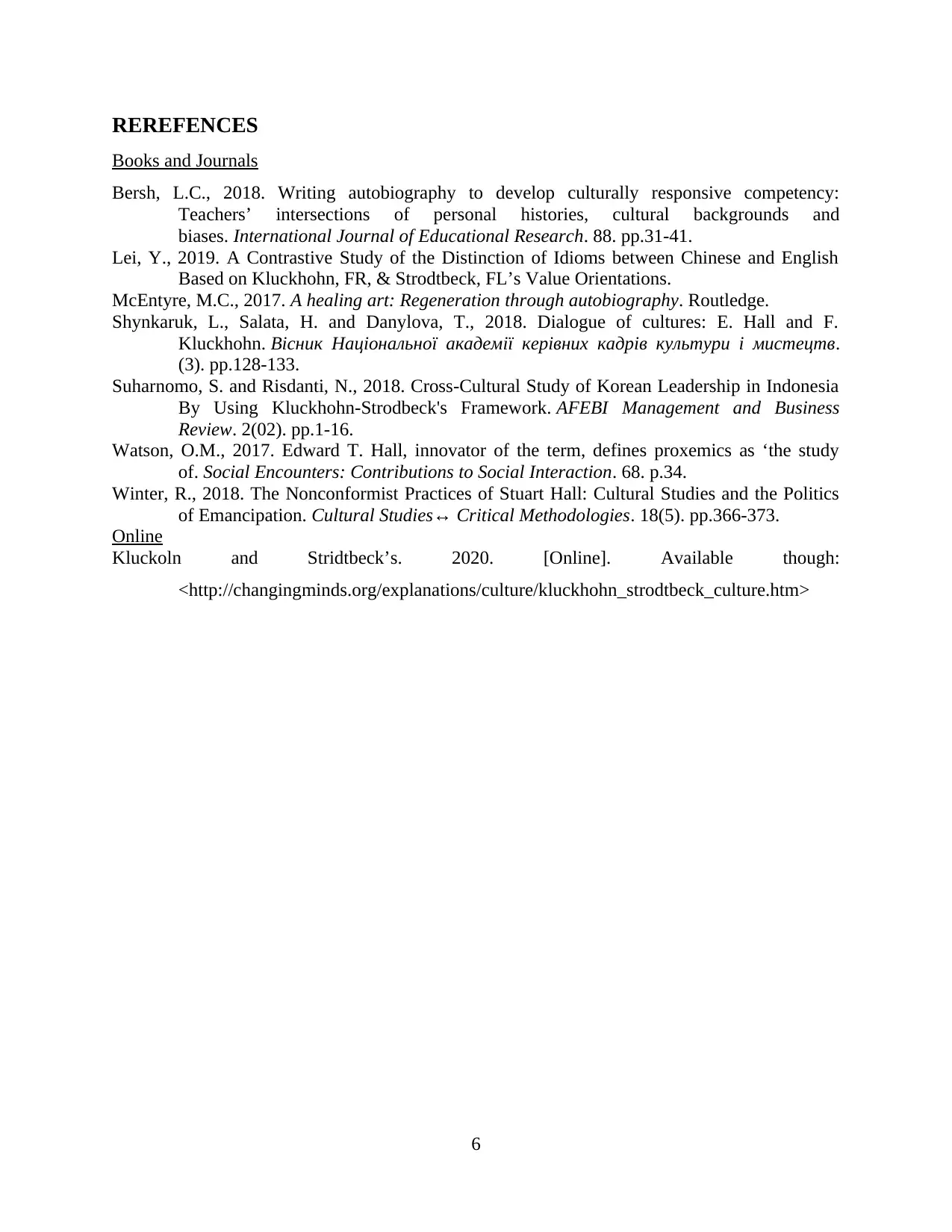
REREFENCES
Books and Journals
Bersh, L.C., 2018. Writing autobiography to develop culturally responsive competency:
Teachers’ intersections of personal histories, cultural backgrounds and
biases. International Journal of Educational Research. 88. pp.31-41.
Lei, Y., 2019. A Contrastive Study of the Distinction of Idioms between Chinese and English
Based on Kluckhohn, FR, & Strodtbeck, FL’s Value Orientations.
McEntyre, M.C., 2017. A healing art: Regeneration through autobiography. Routledge.
Shynkaruk, L., Salata, H. and Danylova, T., 2018. Dialogue of cultures: E. Hall and F.
Kluckhohn. Вісник Національної академії керівних кадрів культури і мистецтв.
(3). pp.128-133.
Suharnomo, S. and Risdanti, N., 2018. Cross-Cultural Study of Korean Leadership in Indonesia
By Using Kluckhohn-Strodbeck's Framework. AFEBI Management and Business
Review. 2(02). pp.1-16.
Watson, O.M., 2017. Edward T. Hall, innovator of the term, defines proxemics as ‘the study
of. Social Encounters: Contributions to Social Interaction. 68. p.34.
Winter, R., 2018. The Nonconformist Practices of Stuart Hall: Cultural Studies and the Politics
of Emancipation. Cultural Studies↔ Critical Methodologies. 18(5). pp.366-373.
Online
Kluckoln and Stridtbeck’s. 2020. [Online]. Available though:
<http://changingminds.org/explanations/culture/kluckhohn_strodtbeck_culture.htm>
6
Books and Journals
Bersh, L.C., 2018. Writing autobiography to develop culturally responsive competency:
Teachers’ intersections of personal histories, cultural backgrounds and
biases. International Journal of Educational Research. 88. pp.31-41.
Lei, Y., 2019. A Contrastive Study of the Distinction of Idioms between Chinese and English
Based on Kluckhohn, FR, & Strodtbeck, FL’s Value Orientations.
McEntyre, M.C., 2017. A healing art: Regeneration through autobiography. Routledge.
Shynkaruk, L., Salata, H. and Danylova, T., 2018. Dialogue of cultures: E. Hall and F.
Kluckhohn. Вісник Національної академії керівних кадрів культури і мистецтв.
(3). pp.128-133.
Suharnomo, S. and Risdanti, N., 2018. Cross-Cultural Study of Korean Leadership in Indonesia
By Using Kluckhohn-Strodbeck's Framework. AFEBI Management and Business
Review. 2(02). pp.1-16.
Watson, O.M., 2017. Edward T. Hall, innovator of the term, defines proxemics as ‘the study
of. Social Encounters: Contributions to Social Interaction. 68. p.34.
Winter, R., 2018. The Nonconformist Practices of Stuart Hall: Cultural Studies and the Politics
of Emancipation. Cultural Studies↔ Critical Methodologies. 18(5). pp.366-373.
Online
Kluckoln and Stridtbeck’s. 2020. [Online]. Available though:
<http://changingminds.org/explanations/culture/kluckhohn_strodtbeck_culture.htm>
6
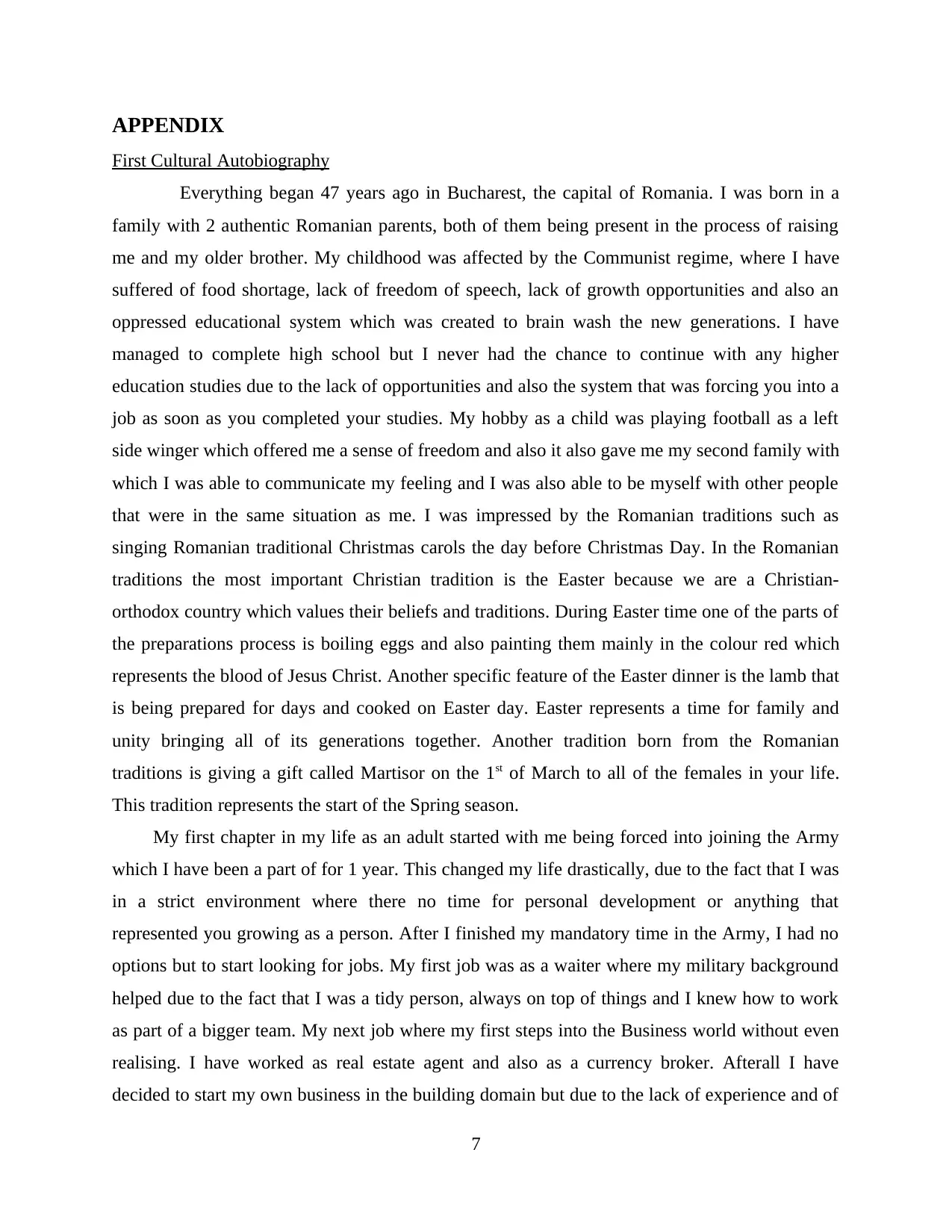
APPENDIX
First Cultural Autobiography
Everything began 47 years ago in Bucharest, the capital of Romania. I was born in a
family with 2 authentic Romanian parents, both of them being present in the process of raising
me and my older brother. My childhood was affected by the Communist regime, where I have
suffered of food shortage, lack of freedom of speech, lack of growth opportunities and also an
oppressed educational system which was created to brain wash the new generations. I have
managed to complete high school but I never had the chance to continue with any higher
education studies due to the lack of opportunities and also the system that was forcing you into a
job as soon as you completed your studies. My hobby as a child was playing football as a left
side winger which offered me a sense of freedom and also it also gave me my second family with
which I was able to communicate my feeling and I was also able to be myself with other people
that were in the same situation as me. I was impressed by the Romanian traditions such as
singing Romanian traditional Christmas carols the day before Christmas Day. In the Romanian
traditions the most important Christian tradition is the Easter because we are a Christian-
orthodox country which values their beliefs and traditions. During Easter time one of the parts of
the preparations process is boiling eggs and also painting them mainly in the colour red which
represents the blood of Jesus Christ. Another specific feature of the Easter dinner is the lamb that
is being prepared for days and cooked on Easter day. Easter represents a time for family and
unity bringing all of its generations together. Another tradition born from the Romanian
traditions is giving a gift called Martisor on the 1st of March to all of the females in your life.
This tradition represents the start of the Spring season.
My first chapter in my life as an adult started with me being forced into joining the Army
which I have been a part of for 1 year. This changed my life drastically, due to the fact that I was
in a strict environment where there no time for personal development or anything that
represented you growing as a person. After I finished my mandatory time in the Army, I had no
options but to start looking for jobs. My first job was as a waiter where my military background
helped due to the fact that I was a tidy person, always on top of things and I knew how to work
as part of a bigger team. My next job where my first steps into the Business world without even
realising. I have worked as real estate agent and also as a currency broker. Afterall I have
decided to start my own business in the building domain but due to the lack of experience and of
7
First Cultural Autobiography
Everything began 47 years ago in Bucharest, the capital of Romania. I was born in a
family with 2 authentic Romanian parents, both of them being present in the process of raising
me and my older brother. My childhood was affected by the Communist regime, where I have
suffered of food shortage, lack of freedom of speech, lack of growth opportunities and also an
oppressed educational system which was created to brain wash the new generations. I have
managed to complete high school but I never had the chance to continue with any higher
education studies due to the lack of opportunities and also the system that was forcing you into a
job as soon as you completed your studies. My hobby as a child was playing football as a left
side winger which offered me a sense of freedom and also it also gave me my second family with
which I was able to communicate my feeling and I was also able to be myself with other people
that were in the same situation as me. I was impressed by the Romanian traditions such as
singing Romanian traditional Christmas carols the day before Christmas Day. In the Romanian
traditions the most important Christian tradition is the Easter because we are a Christian-
orthodox country which values their beliefs and traditions. During Easter time one of the parts of
the preparations process is boiling eggs and also painting them mainly in the colour red which
represents the blood of Jesus Christ. Another specific feature of the Easter dinner is the lamb that
is being prepared for days and cooked on Easter day. Easter represents a time for family and
unity bringing all of its generations together. Another tradition born from the Romanian
traditions is giving a gift called Martisor on the 1st of March to all of the females in your life.
This tradition represents the start of the Spring season.
My first chapter in my life as an adult started with me being forced into joining the Army
which I have been a part of for 1 year. This changed my life drastically, due to the fact that I was
in a strict environment where there no time for personal development or anything that
represented you growing as a person. After I finished my mandatory time in the Army, I had no
options but to start looking for jobs. My first job was as a waiter where my military background
helped due to the fact that I was a tidy person, always on top of things and I knew how to work
as part of a bigger team. My next job where my first steps into the Business world without even
realising. I have worked as real estate agent and also as a currency broker. Afterall I have
decided to start my own business in the building domain but due to the lack of experience and of
7
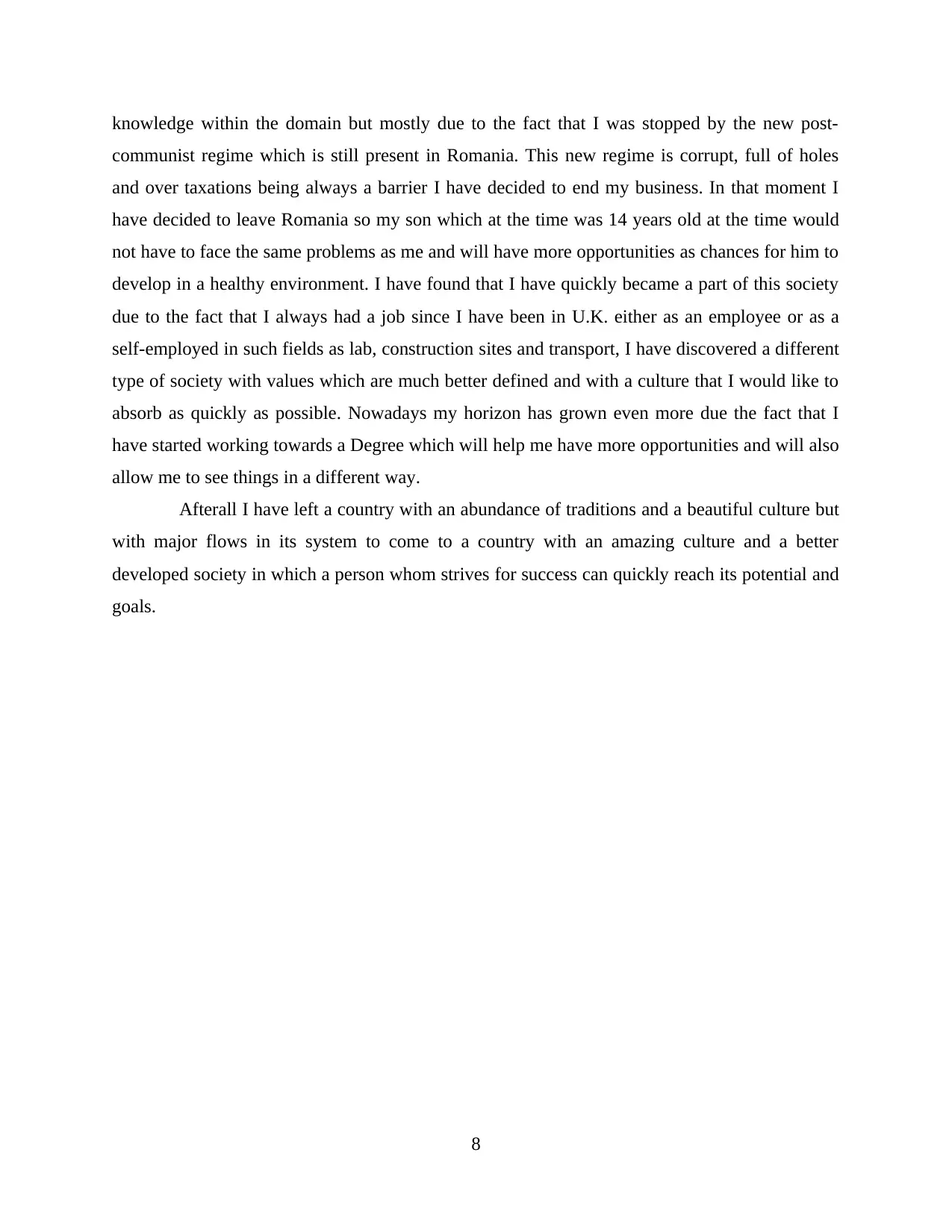
knowledge within the domain but mostly due to the fact that I was stopped by the new post-
communist regime which is still present in Romania. This new regime is corrupt, full of holes
and over taxations being always a barrier I have decided to end my business. In that moment I
have decided to leave Romania so my son which at the time was 14 years old at the time would
not have to face the same problems as me and will have more opportunities as chances for him to
develop in a healthy environment. I have found that I have quickly became a part of this society
due to the fact that I always had a job since I have been in U.K. either as an employee or as a
self-employed in such fields as lab, construction sites and transport, I have discovered a different
type of society with values which are much better defined and with a culture that I would like to
absorb as quickly as possible. Nowadays my horizon has grown even more due the fact that I
have started working towards a Degree which will help me have more opportunities and will also
allow me to see things in a different way.
Afterall I have left a country with an abundance of traditions and a beautiful culture but
with major flows in its system to come to a country with an amazing culture and a better
developed society in which a person whom strives for success can quickly reach its potential and
goals.
8
communist regime which is still present in Romania. This new regime is corrupt, full of holes
and over taxations being always a barrier I have decided to end my business. In that moment I
have decided to leave Romania so my son which at the time was 14 years old at the time would
not have to face the same problems as me and will have more opportunities as chances for him to
develop in a healthy environment. I have found that I have quickly became a part of this society
due to the fact that I always had a job since I have been in U.K. either as an employee or as a
self-employed in such fields as lab, construction sites and transport, I have discovered a different
type of society with values which are much better defined and with a culture that I would like to
absorb as quickly as possible. Nowadays my horizon has grown even more due the fact that I
have started working towards a Degree which will help me have more opportunities and will also
allow me to see things in a different way.
Afterall I have left a country with an abundance of traditions and a beautiful culture but
with major flows in its system to come to a country with an amazing culture and a better
developed society in which a person whom strives for success can quickly reach its potential and
goals.
8
Secure Best Marks with AI Grader
Need help grading? Try our AI Grader for instant feedback on your assignments.
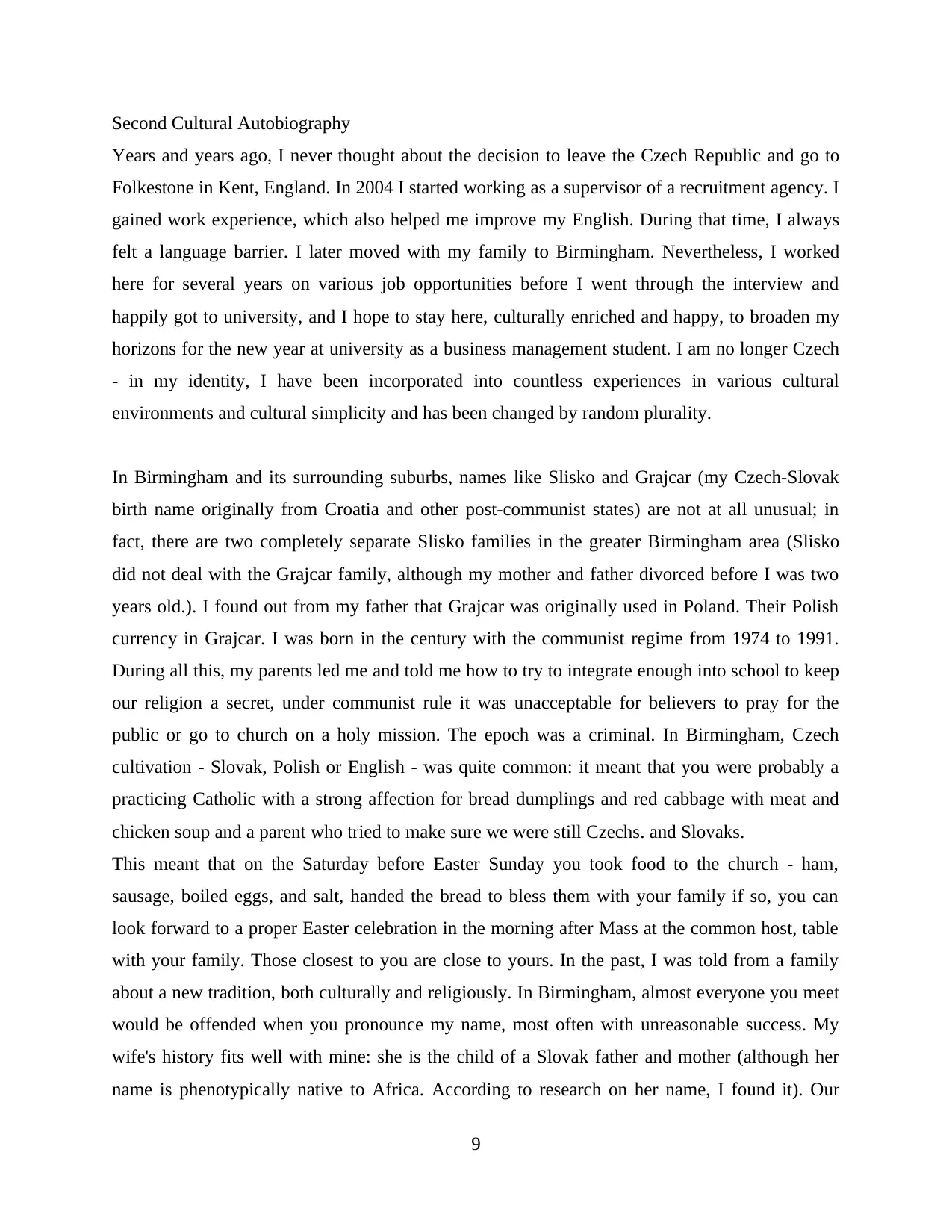
Second Cultural Autobiography
Years and years ago, I never thought about the decision to leave the Czech Republic and go to
Folkestone in Kent, England. In 2004 I started working as a supervisor of a recruitment agency. I
gained work experience, which also helped me improve my English. During that time, I always
felt a language barrier. I later moved with my family to Birmingham. Nevertheless, I worked
here for several years on various job opportunities before I went through the interview and
happily got to university, and I hope to stay here, culturally enriched and happy, to broaden my
horizons for the new year at university as a business management student. I am no longer Czech
- in my identity, I have been incorporated into countless experiences in various cultural
environments and cultural simplicity and has been changed by random plurality.
In Birmingham and its surrounding suburbs, names like Slisko and Grajcar (my Czech-Slovak
birth name originally from Croatia and other post-communist states) are not at all unusual; in
fact, there are two completely separate Slisko families in the greater Birmingham area (Slisko
did not deal with the Grajcar family, although my mother and father divorced before I was two
years old.). I found out from my father that Grajcar was originally used in Poland. Their Polish
currency in Grajcar. I was born in the century with the communist regime from 1974 to 1991.
During all this, my parents led me and told me how to try to integrate enough into school to keep
our religion a secret, under communist rule it was unacceptable for believers to pray for the
public or go to church on a holy mission. The epoch was a criminal. In Birmingham, Czech
cultivation - Slovak, Polish or English - was quite common: it meant that you were probably a
practicing Catholic with a strong affection for bread dumplings and red cabbage with meat and
chicken soup and a parent who tried to make sure we were still Czechs. and Slovaks.
This meant that on the Saturday before Easter Sunday you took food to the church - ham,
sausage, boiled eggs, and salt, handed the bread to bless them with your family if so, you can
look forward to a proper Easter celebration in the morning after Mass at the common host, table
with your family. Those closest to you are close to yours. In the past, I was told from a family
about a new tradition, both culturally and religiously. In Birmingham, almost everyone you meet
would be offended when you pronounce my name, most often with unreasonable success. My
wife's history fits well with mine: she is the child of a Slovak father and mother (although her
name is phenotypically native to Africa. According to research on her name, I found it). Our
9
Years and years ago, I never thought about the decision to leave the Czech Republic and go to
Folkestone in Kent, England. In 2004 I started working as a supervisor of a recruitment agency. I
gained work experience, which also helped me improve my English. During that time, I always
felt a language barrier. I later moved with my family to Birmingham. Nevertheless, I worked
here for several years on various job opportunities before I went through the interview and
happily got to university, and I hope to stay here, culturally enriched and happy, to broaden my
horizons for the new year at university as a business management student. I am no longer Czech
- in my identity, I have been incorporated into countless experiences in various cultural
environments and cultural simplicity and has been changed by random plurality.
In Birmingham and its surrounding suburbs, names like Slisko and Grajcar (my Czech-Slovak
birth name originally from Croatia and other post-communist states) are not at all unusual; in
fact, there are two completely separate Slisko families in the greater Birmingham area (Slisko
did not deal with the Grajcar family, although my mother and father divorced before I was two
years old.). I found out from my father that Grajcar was originally used in Poland. Their Polish
currency in Grajcar. I was born in the century with the communist regime from 1974 to 1991.
During all this, my parents led me and told me how to try to integrate enough into school to keep
our religion a secret, under communist rule it was unacceptable for believers to pray for the
public or go to church on a holy mission. The epoch was a criminal. In Birmingham, Czech
cultivation - Slovak, Polish or English - was quite common: it meant that you were probably a
practicing Catholic with a strong affection for bread dumplings and red cabbage with meat and
chicken soup and a parent who tried to make sure we were still Czechs. and Slovaks.
This meant that on the Saturday before Easter Sunday you took food to the church - ham,
sausage, boiled eggs, and salt, handed the bread to bless them with your family if so, you can
look forward to a proper Easter celebration in the morning after Mass at the common host, table
with your family. Those closest to you are close to yours. In the past, I was told from a family
about a new tradition, both culturally and religiously. In Birmingham, almost everyone you meet
would be offended when you pronounce my name, most often with unreasonable success. My
wife's history fits well with mine: she is the child of a Slovak father and mother (although her
name is phenotypically native to Africa. According to research on her name, I found it). Our
9
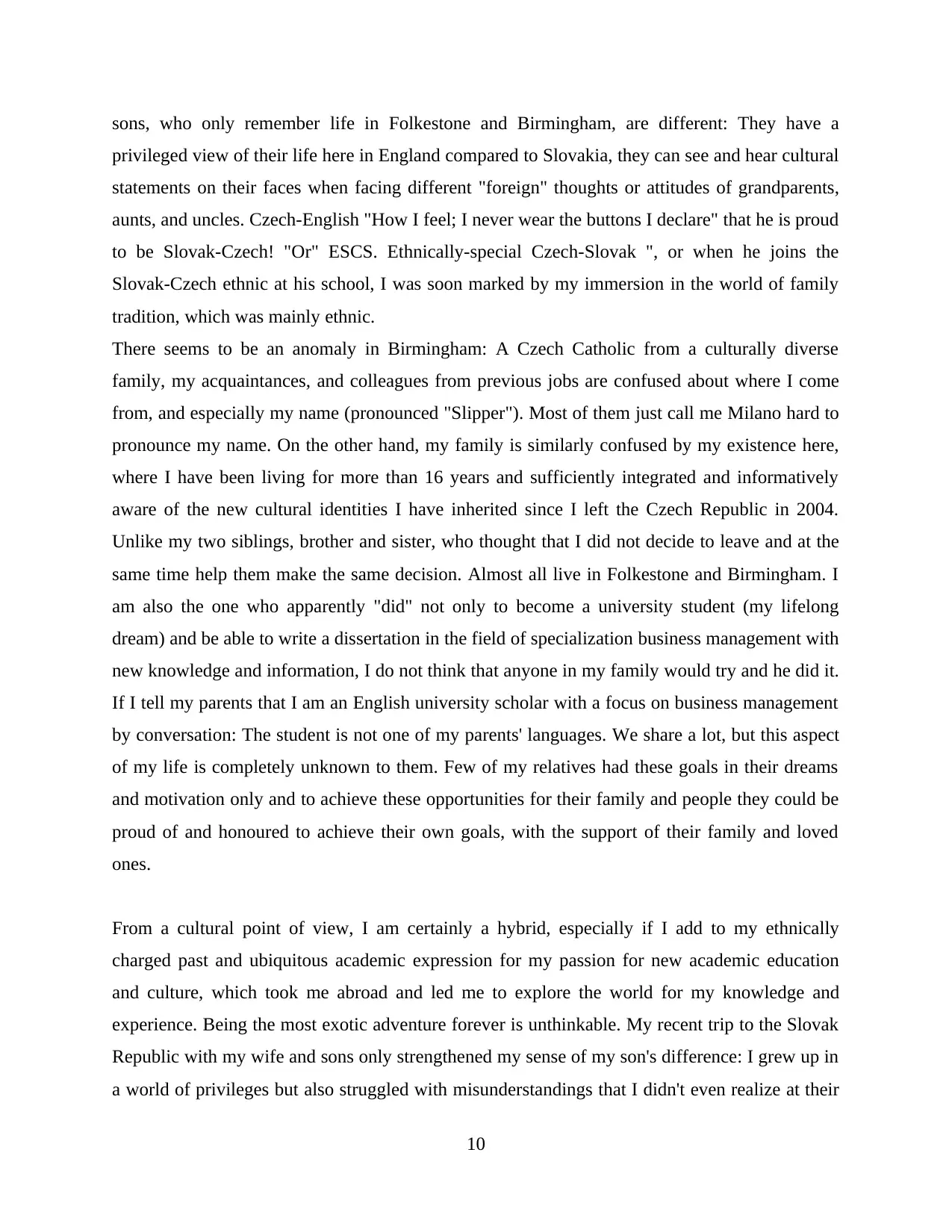
sons, who only remember life in Folkestone and Birmingham, are different: They have a
privileged view of their life here in England compared to Slovakia, they can see and hear cultural
statements on their faces when facing different "foreign" thoughts or attitudes of grandparents,
aunts, and uncles. Czech-English "How I feel; I never wear the buttons I declare" that he is proud
to be Slovak-Czech! "Or" ESCS. Ethnically-special Czech-Slovak ", or when he joins the
Slovak-Czech ethnic at his school, I was soon marked by my immersion in the world of family
tradition, which was mainly ethnic.
There seems to be an anomaly in Birmingham: A Czech Catholic from a culturally diverse
family, my acquaintances, and colleagues from previous jobs are confused about where I come
from, and especially my name (pronounced "Slipper"). Most of them just call me Milano hard to
pronounce my name. On the other hand, my family is similarly confused by my existence here,
where I have been living for more than 16 years and sufficiently integrated and informatively
aware of the new cultural identities I have inherited since I left the Czech Republic in 2004.
Unlike my two siblings, brother and sister, who thought that I did not decide to leave and at the
same time help them make the same decision. Almost all live in Folkestone and Birmingham. I
am also the one who apparently "did" not only to become a university student (my lifelong
dream) and be able to write a dissertation in the field of specialization business management with
new knowledge and information, I do not think that anyone in my family would try and he did it.
If I tell my parents that I am an English university scholar with a focus on business management
by conversation: The student is not one of my parents' languages. We share a lot, but this aspect
of my life is completely unknown to them. Few of my relatives had these goals in their dreams
and motivation only and to achieve these opportunities for their family and people they could be
proud of and honoured to achieve their own goals, with the support of their family and loved
ones.
From a cultural point of view, I am certainly a hybrid, especially if I add to my ethnically
charged past and ubiquitous academic expression for my passion for new academic education
and culture, which took me abroad and led me to explore the world for my knowledge and
experience. Being the most exotic adventure forever is unthinkable. My recent trip to the Slovak
Republic with my wife and sons only strengthened my sense of my son's difference: I grew up in
a world of privileges but also struggled with misunderstandings that I didn't even realize at their
10
privileged view of their life here in England compared to Slovakia, they can see and hear cultural
statements on their faces when facing different "foreign" thoughts or attitudes of grandparents,
aunts, and uncles. Czech-English "How I feel; I never wear the buttons I declare" that he is proud
to be Slovak-Czech! "Or" ESCS. Ethnically-special Czech-Slovak ", or when he joins the
Slovak-Czech ethnic at his school, I was soon marked by my immersion in the world of family
tradition, which was mainly ethnic.
There seems to be an anomaly in Birmingham: A Czech Catholic from a culturally diverse
family, my acquaintances, and colleagues from previous jobs are confused about where I come
from, and especially my name (pronounced "Slipper"). Most of them just call me Milano hard to
pronounce my name. On the other hand, my family is similarly confused by my existence here,
where I have been living for more than 16 years and sufficiently integrated and informatively
aware of the new cultural identities I have inherited since I left the Czech Republic in 2004.
Unlike my two siblings, brother and sister, who thought that I did not decide to leave and at the
same time help them make the same decision. Almost all live in Folkestone and Birmingham. I
am also the one who apparently "did" not only to become a university student (my lifelong
dream) and be able to write a dissertation in the field of specialization business management with
new knowledge and information, I do not think that anyone in my family would try and he did it.
If I tell my parents that I am an English university scholar with a focus on business management
by conversation: The student is not one of my parents' languages. We share a lot, but this aspect
of my life is completely unknown to them. Few of my relatives had these goals in their dreams
and motivation only and to achieve these opportunities for their family and people they could be
proud of and honoured to achieve their own goals, with the support of their family and loved
ones.
From a cultural point of view, I am certainly a hybrid, especially if I add to my ethnically
charged past and ubiquitous academic expression for my passion for new academic education
and culture, which took me abroad and led me to explore the world for my knowledge and
experience. Being the most exotic adventure forever is unthinkable. My recent trip to the Slovak
Republic with my wife and sons only strengthened my sense of my son's difference: I grew up in
a world of privileges but also struggled with misunderstandings that I didn't even realize at their
10
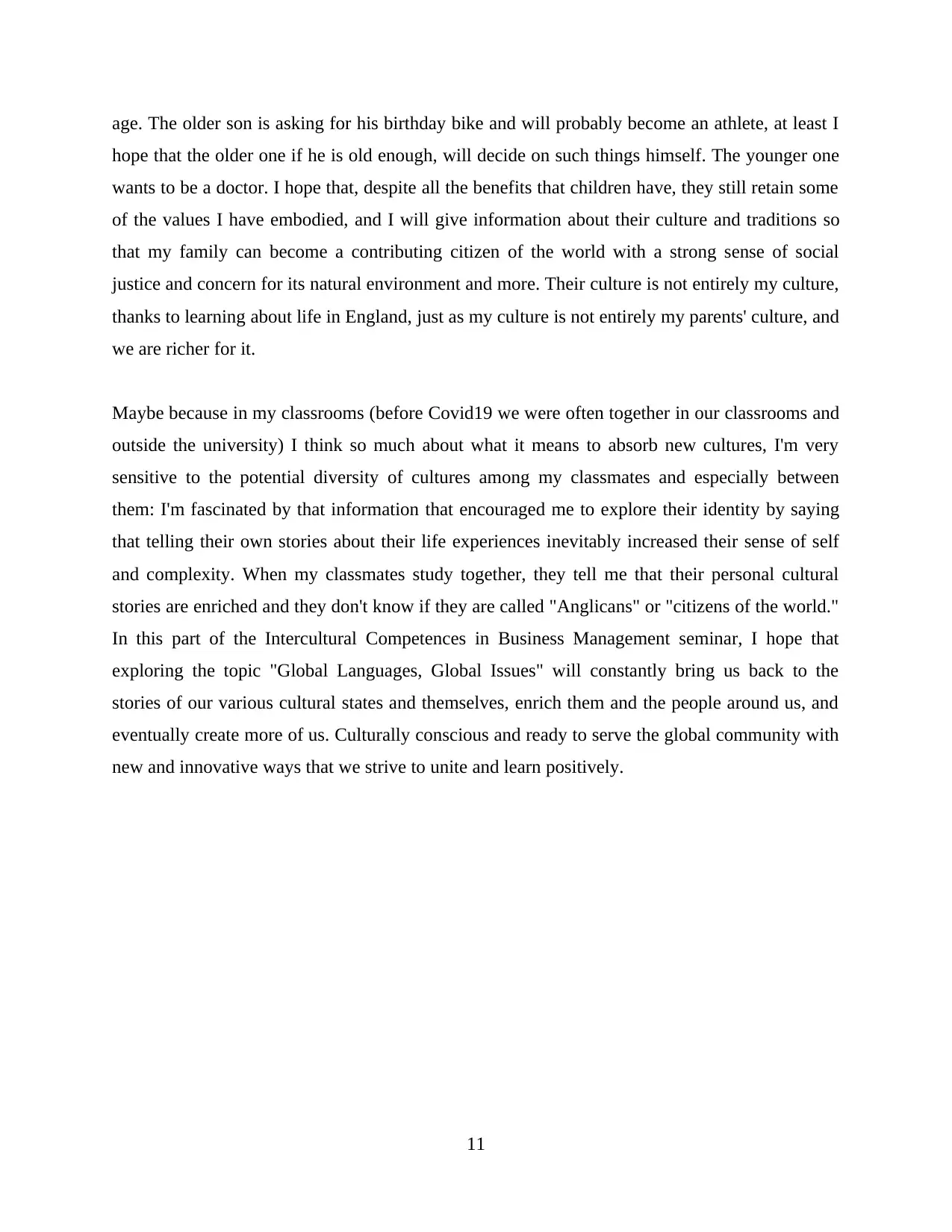
age. The older son is asking for his birthday bike and will probably become an athlete, at least I
hope that the older one if he is old enough, will decide on such things himself. The younger one
wants to be a doctor. I hope that, despite all the benefits that children have, they still retain some
of the values I have embodied, and I will give information about their culture and traditions so
that my family can become a contributing citizen of the world with a strong sense of social
justice and concern for its natural environment and more. Their culture is not entirely my culture,
thanks to learning about life in England, just as my culture is not entirely my parents' culture, and
we are richer for it.
Maybe because in my classrooms (before Covid19 we were often together in our classrooms and
outside the university) I think so much about what it means to absorb new cultures, I'm very
sensitive to the potential diversity of cultures among my classmates and especially between
them: I'm fascinated by that information that encouraged me to explore their identity by saying
that telling their own stories about their life experiences inevitably increased their sense of self
and complexity. When my classmates study together, they tell me that their personal cultural
stories are enriched and they don't know if they are called "Anglicans" or "citizens of the world."
In this part of the Intercultural Competences in Business Management seminar, I hope that
exploring the topic "Global Languages, Global Issues" will constantly bring us back to the
stories of our various cultural states and themselves, enrich them and the people around us, and
eventually create more of us. Culturally conscious and ready to serve the global community with
new and innovative ways that we strive to unite and learn positively.
11
hope that the older one if he is old enough, will decide on such things himself. The younger one
wants to be a doctor. I hope that, despite all the benefits that children have, they still retain some
of the values I have embodied, and I will give information about their culture and traditions so
that my family can become a contributing citizen of the world with a strong sense of social
justice and concern for its natural environment and more. Their culture is not entirely my culture,
thanks to learning about life in England, just as my culture is not entirely my parents' culture, and
we are richer for it.
Maybe because in my classrooms (before Covid19 we were often together in our classrooms and
outside the university) I think so much about what it means to absorb new cultures, I'm very
sensitive to the potential diversity of cultures among my classmates and especially between
them: I'm fascinated by that information that encouraged me to explore their identity by saying
that telling their own stories about their life experiences inevitably increased their sense of self
and complexity. When my classmates study together, they tell me that their personal cultural
stories are enriched and they don't know if they are called "Anglicans" or "citizens of the world."
In this part of the Intercultural Competences in Business Management seminar, I hope that
exploring the topic "Global Languages, Global Issues" will constantly bring us back to the
stories of our various cultural states and themselves, enrich them and the people around us, and
eventually create more of us. Culturally conscious and ready to serve the global community with
new and innovative ways that we strive to unite and learn positively.
11
1 out of 13
Your All-in-One AI-Powered Toolkit for Academic Success.
+13062052269
info@desklib.com
Available 24*7 on WhatsApp / Email
![[object Object]](/_next/static/media/star-bottom.7253800d.svg)
Unlock your academic potential
© 2024 | Zucol Services PVT LTD | All rights reserved.





